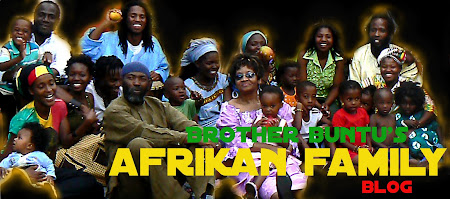Kwanzaa is meaningful to more than 25 million Afrikans around the world who observe this 7 day ceremony where thanks is given for achievements made. Although seen by many as exclusively an African American holiday, it is by origin and in nature a Pan-African ceremony based on ancient rituals of renewal and nationhood.
Having hosted Kwanzaa celebrations in Azania (South Afrika) - through my company Ebukhosini Solutions - since 2002, I would like to share some of the particular basis in Southern Afrikan culture from which Kwanzaa is drawn:
“First Fruits Festivals” are celebrated all over the Afrikan continent. These ceremonies, which essentially celebrate the first crops, are significant in that they focus on leadership, unity, achievements and preparations for the future. All over the world Afrikans and Afrikan Descendants today are celebrating Kwanzaa – a modernized version of ancient Afrikan “First Fruits Festivals”. In researching how these celebrations were observed traditionally in southern Afrika, it becomes evident that these ceremonies share common bonds throughout the continent. The following is a brief outline of how the festivals are still observed in the southern region.
Zululand
UMKHOSI WOKWESHWAMA – The Celebration of the First Fruits
The annual First Fruits Celebration Ceremony (Umkhosi Wokweshwama) is a very important occasion in the Zulu Nation. Traditionally, the Zulu Monarch, King Goodwill Zwelithini, has to eat the first produce and pray to God (uMvelinqangi) to bless the land to produce abundant good food for His people. During this event, young men (amabutho) are invited by the King to participate in different rituals.
What also makes this ceremony very important is the strong belief that it strengthens the King and his Kingdom. The Zulu Monarch uses this opportunity to talk to the Nation, more especially, to young and old men, focusing on issues such as HIV/Aids, moral regeneration and fighting poverty. Furthermore he addresses men on how they should conduct themselves as heads of their families and as role models in their communities. He also encourages them to lead their communities in agricultural practices in order to fight poverty.
In 2004 the Umkhosi Wokweshwama celebration was organised by the KZN Department of Education and Culture at Enyokeni Royal Palace, KwaNongoma. It started on 11th December. The ceremony of the King having talks with his men was staged as workshops conducted in collaboration with local government and traditional leadership structures.
Swaziland
INCWALA – The Kingship Ceremony
One of the most important festivals of the Swazi Nation is the Incwala or “Festival of the First Fruits”. This ceremony, which essentially is a Kingship Ceremony, brings the country together to gain the blessing of ancestors, sanctify the kingship and celebrate the beginning the harvest season. Incwala is observed in December/January and features two festivals: Little Incwala (2 days) and Big Incwala (6 days).
Incwala is held in December/January of each year. At a time of the new moon preceding the event, officials visit the main rivers of Swaziland and return to the Nations ancestral home, on the shores of the Indian Ocean near Maputo, to gather sea water. At this time the King goes into seclusion.
Every Swazi may take part in the public parts of the Incwala. The key figures are the King, Queen Mother, royal wives and children, the royal governors (indunas), the chiefs, the regiments, and the "bemanti" (the ‘water people’).
The Marula Fruit
Other “First Fruits Festivals” in Southern Afrika coincide with the ripening of the Marula fruit. The Tsonga people call the kernel of the Marula “Food of the Kings”. The Northern Sotho people see the tree as a gift from the spirits and regard it as sacred. The tree is dioecious, meaning there are separate male and female trees. Hence the Marula tree is also associated with fertility.

Photo: Afrikans of many backgrounds and differences came together at Ebukhosini in Johannesburg, South Afrika, to celebrate Kwanzaa in 2006

5 comments:
Thanks for writing this.
Thanks so much for this information!
I have wanted to learn more about the First Fruits celebrations on the Motherland.....now I have some great info to launch my study!
Wishing you peace always
msadinkra
I must digg your article so other folks can look at it, very helpful, I had a tough time finding the results searching on the web, thanks.
- Thomas
Ase, thank you for this post. It is important for USA Afr Americans to know that our African Brothers and Sisters will be celebrating Brother Ron Karenga's Kwaanza week long event.
Greetings my elder I have questions about this year celebrations.where can I go for more information?
Post a Comment